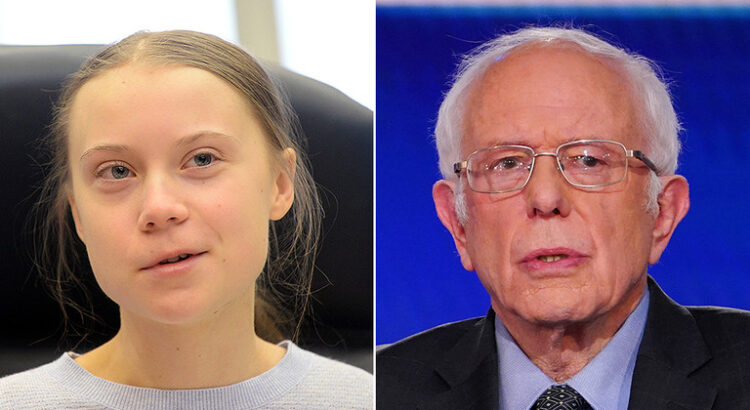By: Slavoj Zizek
With everything that’s plunging the world into chaos right now, one thing surprising me is, why are Greta Thunberg and Bernie Sanders comparatively quiet? Make no mistake, racism, climate issues and the pandemic are all connected.
Except for a short note from Greta that she thinks she survived the Covid infection, the movement she has mobilized has failed to avoid getting drowned out by the Covid-19 pandemic panic and the anti-racism protests in the US. As for Bernie, although he advocated measures (like universal healthcare) which are now, amid the pandemic, recognized as necessary all around the world, he is also effectively nowhere to be seen or heard. Why aren’t we seeing more, not less, of the political figures whose programs and insights are today more relevant than ever?
In the last months, the topic of Covid totally eclipsed ecological concerns and was only overshadowed in the last weeks by anti-racist protests which spread from the US all around the globe. The crucial ideological and political battle that is going on these days concerns the relationship between the three domains: Covid epidemics, ecological crises, racism. The pressure that comes from the establishment is to keep these three domains apart, and even to hint at tensions between them. One often hears that our main task now is to get the economy moving, and that to do this we should neglect ecological problems a little bit; one hears that chaotic anti-racist protests often violate social distancing and for that reason contribute to spreading Covid infections… Against this line of reasoning, one should insist on the basic unity of the three domains: epidemics explode as part of our unbalanced relationship with our natural environs, they are not just a health problem; anti-racist protests were also given the additional boost by the fact that racial minorities are much more threatened by the epidemics than the white majority which can afford self-isolation and better medical care. We are thus dealing with crises which erupt as moments of the dynamics of global capitalism: all three – viral epidemics, racial unrests, ecological crises – were not only predicted but were already accompanying us for decades.
As for the anti-racist protests, here is how Spike Lee answered the question “Why did eight years of Obama fail to make substantial enough change to race relations in the US?”: “Very good question. But you have to understand: race relations – which have gotten worse – are a direct response to having a black president.” Why? Not because Obama was “not black enough,” but because he embodied the image of a black American advocated by the liberal Left, a black American who succeeded while fully respecting the rules of the liberal game. Protests are a brutal reply to “Now you have a black president, what more do you want?” It is our task to articulate this ”more.” Just remember that, during the eight years of Obama’s presidency, the general tendency of the last decades went smoothly on: the gap between the rich and the poor widened, big capital got stronger. In one of the episodes of ‘The Good Fight’, to follow-up series to ‘The Good Wife’, the heroine awakens in an alternate reality in which Hillary Clinton won the election in 2016, defeating Trump. But the result is paradoxical for feminism: there is no ‘Me Too’, there are no wide protests against Weinstein because moderate establishment Left feminists fear that if there is too strong a protest against male harassment of women, Clinton may lose male votes and not be re-elected, plus Weinstein is a great donor to the Clinton campaign… Did something similar not happen with Obama?
The point is not just (or primarily) that black people should be given more financial support to help their economic situation. There is a wonderful detail in Spike Lee’s Malcolm X: after Malcolm gave a speech in a college, a white female student approaches him and asks him what she can do for the black struggle for liberation; he coldly answers her, “Nothing.” And walks away… When I used this example decades ago, I was criticized for implying that we whites shouldn’t do anything to support the black struggle; but my (and, I think, Malcolm’s) point was more precise. White liberals should not act as if they will liberate the black people, they should support black people in their own struggle for liberation – treating them as autonomous agents, not as mere victims of circumstances.
So, back to our starting question: the disappearance of Greta and Bernie from our public space does not mean that they were too radical for our time of viral crisis when more unifying voices are needed. On the contrary, they were not radical enough: they did not succeed in proposing a global new vision that would re-actualize their project in the conditions of epidemics.
Source and Image: https://www.rt.com/op-ed/491881-bernie-sanders-greta-thunberg/







 Users Today : 86
Users Today : 86 Total Users : 35460103
Total Users : 35460103 Views Today : 107
Views Today : 107 Total views : 3418738
Total views : 3418738